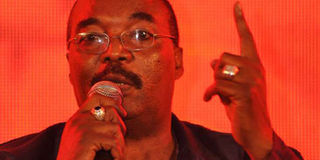Premium
Jean Kasongo has left an indelible mark in music

Jean Claude Kasongo was one of the best vocalists of the 70s and 80s when nightclubs were popular in East Africa. PHOTO | FILE | NATION MEDIA GROUP
What you need to know:
- Kasongo also recorded songs outside Super Mazembe but remained a group member until he took over the leadership in 2000 after the death of Longwa.
- Members of the groups could have done better in life had they been in a country like Tanzania, where royalties are protected.
As messages of condolences keep pouring in, Kenyans of my generation agree that Jean Claude Kasongo — also known as Kasongo wa Kanema — would earn a place in any starting line-up of a big orchestra.
Kasongo will be buried at Lang’ata cemetery on Friday, but the artiste will be remembered as the finest soprano and bass vocalist Orchestra Super Mazembe produced.
Baba Morris, as he was popularly known, joined Super Mazembe when the group decided to change its beat to Kavacha, a popular rhythm/dance reportedly invented in 1973.
The others who joined the group with Kasongo were guitarist Loboko Persie (Pasi) and singer Lovy Mokolo Longomba, who died in a road accident in Tanzania in 1996.
The arrival of the three stars brought honour and greatness to the band that made its way into Kenya in 1975.
Kasongo wa Kanema will be fondly remembered for his heavy voice, especially when he combined with Lovy as the Longwa Didos or Katele Aley (also deceased) provided the backup.
BEST VOCALIST
During this period, Super Mazembe released hits like “Naleli Libota”, “Okova”, “Auma”, “Ouma”, “Nanga”, “Lovy”, “Mokano”, “Mukala Musi”, “Loboko”, “Longwa”, “Mado Zaina”, and “Kayembe”, which also featured Bukalos wa Bukasa on solo guitar, Pasi (rhythm) and Atia Djo (bass). There was also Dodo Doris or Petit Musa on drums.
Other band members at the time were Rapok Kayembe, Kasongo Songoley, Lobe Mapako, Atey Sax, Kalombo Mwanza, Abdalla Madjo Maduley, Xieux Carlos, Shaba Bakari, Okello Jose, Fataki Lukasa and Rondo Kandolo.
Kasongo was one of the best vocalists of the 70s and 80s when nightclubs were popular in East Africa. He stood out because of his powerful voice.
During this period, Kasongo composed one of the best-known songs, “Mokano”. Kasongo could hold a note at soprano and provide bass vocals, a talent that made him come close to the level of Josky Kiambukuta, Pepe Kalle, Pepe Ndombe Opetum, Moreno Batamba, Mopero wa Makanisi, Nzaya Nzayadio and Issa Juma.
Super Mazembe drew crowds during the annual Agricultural Society of Kenya band entertainment concerts.
Nightclubs were popular in Nairobi, Mombasa, Kisumu, Kakamega, Nakuru, Kisii and Meru - where Super Mazembe competed with Mangelepa, Maroon Commandos, Les Wanyika, Boma Liwanza, Baba Nationale, Le Noise and Bana Ngenge.
PIRACY
Members of these groups could have done better in life had they been in a country like Tanzania, where royalties are protected.
Most of them never realised the fruits of their labour because of piracy and unscrupulous producers, leaving them in poverty despite producing hits like “Kasongo”, composed by Katele, who died in 2004.
Kasongo also recorded songs outside Super Mazembe but remained a group member until he took over the leadership in 2000 after the death of Longwa.
Before Super Mazembe, Kasongo passed through Baba National, Bwambe Bwambe and other bands. He performed at various joints in Nairobi until he began battling diabetes, hypertension and a stroke.
He has left behind five children and eight grandchildren. Kasongo’s firstborn, Maurice Katende, 43, is a musician; his last-born is Jermaine Serge Kasongo, 22.




